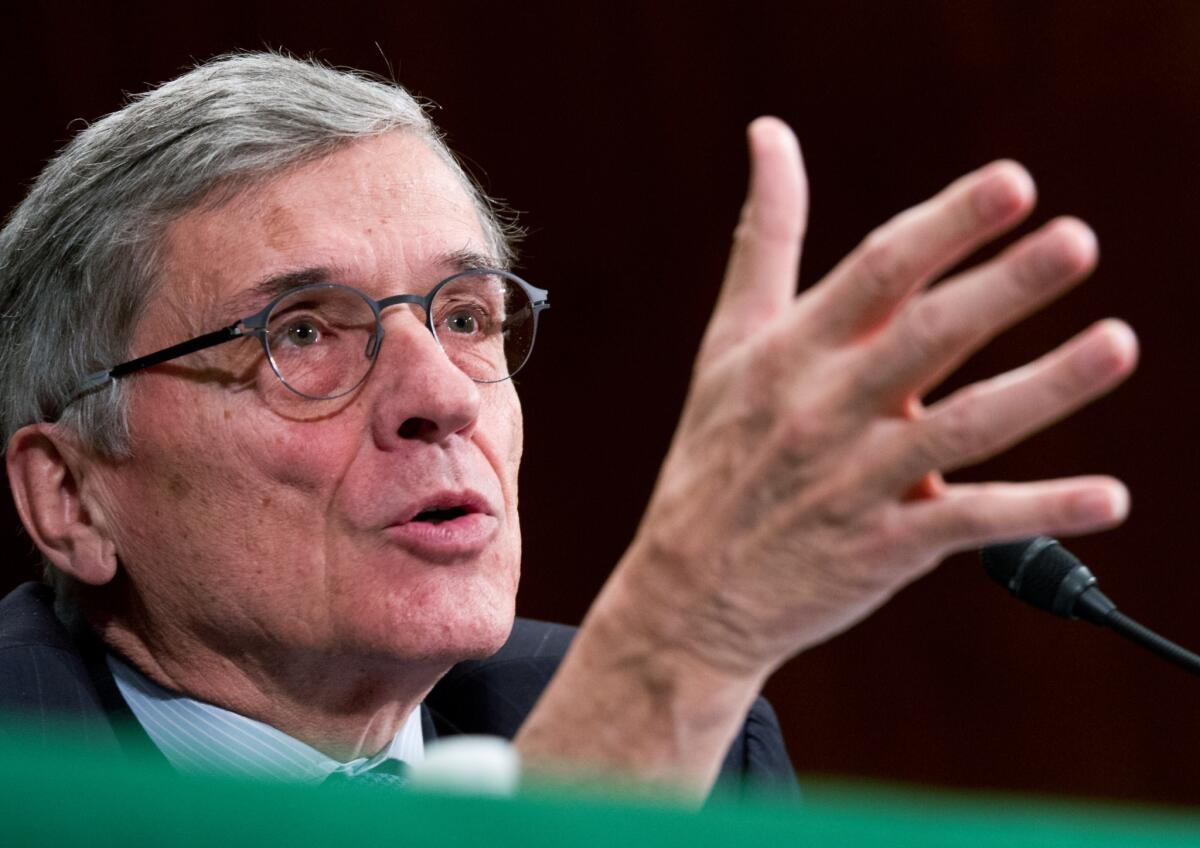Opinion: The FCC mulling new, less neutral rules for the Net

- Share via
Moments after news leaked about a new “Net neutrality” plan from the Federal Communications Commission’s chairman, consumer advocates in Washington began proclaiming their distaste. “With this proposal, the FCC is aiding and abetting the largest ISPs in their efforts to destroy the open Internet,” intoned Craig Aaron of Free Press. “The FCC is inviting ISPs to pick winners and losers online,” declared Michael Weinberg of Public Knowledge.
At issue is a proposal developed by FCC Chairman Tom Wheeler to protect the status quo online in the wake of an appeals court ruling that threw out most of the FCC’s previous Net neutrality rules. According to the Wall Street Journal, the proposal would bar Internet service providers from blocking or discriminating against a website. But it wouldn’t bar an ISP from charging sites more for faster or higher-priority connections to the ISP’s customers, provided the terms were “commercially reasonable,” the Journal reported.
The latter provision is what’s causing consumer advocates’ blood to boil. But unless the FCC reverses its decision to classify broadband as an information service, it may not have the authority to stop this kind of prioritization.
Nor, apparently, does it want to.
The FCC’s previous rules, which the commission worked out after lengthy consultations with ISPs and tech companies, banned ISPs from blocking legal websites and services, barred them from unreasonably discriminating against any legal site or service’s traffic, and required them to disclose the steps they took to manage congestion. The D.C. Circuit Court of Appeals invalidated the first two of those rules in January, saying the commission didn’t prove it had the legal authority to impose such restrictions on information services.
The ruling specifically left room, however, for the commission to impose an anti-blocking rule if it allowed ISPs and websites the freedom to negotiate deals that prioritized some sites’ traffic over others’. Wheeler appears to be taking up the court’s suggestion.
To some Net neutrality advocates, barring ISPs from charging sites for high-priority bit delivery is essential to preserving the free and open nature of the Net. Otherwise, ISPs would be in a position to pick winners and losers online, and deep-pocketed companies would be able to buy their way into the winners circle. They argue that ISPs should treat every bit in a given category -- for example, all those involved in video streams or in online phone calls -- the same way, so upstarts and small businesses would have the same opportunity to attract and build an audience as incumbents and Fortune 500 powerhouses.
That’s an appealing vision of the past, but it’s not the way the Internet operates today. Deep-pocketed companies already invest in content distribution networks that deliver audio, video and images across the Internet in higher quality than companies with just a conventional Web server and limited bandwidth can manage. Cable and phone companies deliver their pay-TV services over the same wire that carries YouTube and other online video outlets, but they manage the bandwidth in a way that assures the quality of the pay-TV signals, not the “over the top” alternatives.
Of course, one could imagine a bandwidth-intensive online service -- say, one that offers movies on demand -- negotiating a deal that enables it to tie up most of the capacity of a typical home broadband connection, freezing out its rivals. So it’s important that the commission include protections in the new rules against anti-competitive behavior.
But with that caveat, allowing ISPs to offer prioritization on “commercially reasonable” terms may simply let ISPs compete more effectively with the content distribution networks that are effectively prioritizing traffic en route to the last mile.
The ruling in January left the commission with three basic choices. The first was to stop trying to adopt Net neutrality rules, which Wheeler has said he doesn’t want to do (although the two Republicans on the commission might). The second was to use the limited authority the court said it had to adopt less prescriptive Net neutrality rules, an approach that Wheeler has said he prefers. The third was to reclassify broadband access as a communications service, which would give the commission the clear authority to impose anti-discrimination rules.
Free Press, Public Knowledge and several other consumer advocacy groups are eager for the commission to choose Door No. 3. Wheeler is not, at least in part because it would trigger a fight with Congress he might not be able to win. Hence his apparent decision to follow the trail of bread crumbs dropped by the D.C. Circuit, which leads to a rule that bars ISPs from blocking legal websites but not from selling a faster track to their customers.
[Updated, April 23, 8:20 p.m.: Wheeler issued a statement Wednesday night, saying the coming proposal wasn’t as advertised. “There are reports that the FCC is gutting the Open Internet rule. They are flat out wrong,” Wheeler said.
His description of the proposal, however, fits what I’ve outlined above. “Tomorrow we will circulate to the Commission a new Open Internet proposal that will restore the concepts of net neutrality consistent with the court’s ruling in January. There is no ‘turnaround in policy.’ The same rules will apply to all Internet content. As with the original Open Internet rules, and consistent with the court’s decision, behavior that harms consumers or competition will not be permitted.”]
ALSO:
Bangladesh’s sweatshops: A boycott is not the answer
The Supreme Court’s struggle to grasp Aereo’s tiny TV antennas
USC student protest: Did the school really have to call their parents?
Follow Jon Healey on Twitter @jcahealey and Google+
More to Read
A cure for the common opinion
Get thought-provoking perspectives with our weekly newsletter.
You may occasionally receive promotional content from the Los Angeles Times.










